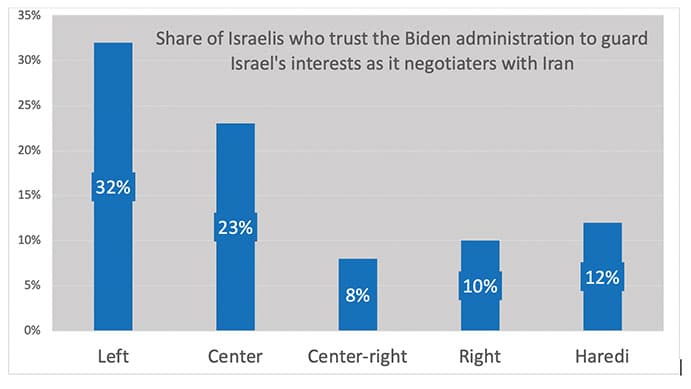 Yoaz Hendel/Wikimedia Commons; Matan Kahana/Wikimedia Commons
Yoaz Hendel/Wikimedia Commons; Matan Kahana/Wikimedia Commons Barely a week into the 2022 election cycle, and things begin to fall into place. Two right-center parties merged, a well-known general weighed his options, a few politicians decided that it is time to say goodbye (lest the voters force them into it), and the ultra-Orthodox parties are back. If there’s anything of significance we can already say about this cycle it is this: Haredi parties were out of power for a year, and they are now returning with a vengeance. No one even attempts to hide that fact; no one even attempts to pretend that there’s an option for a post-election coalition without them.
Consider the story of two politicians. It is not that important except to serve as a lesson to other politicians. The two are ministers in the current government, one a member of Yamina the other of New Hope (which no longer exists as an independent platform). Matan Kahana is Religious Affairs minister. He had a productive year in which he reformed the system of Kosher certificates. He also attempted to reform the system of conversions but failed to get a majority for such a move. Both these moves made him a target of vicious Haredi attacks. He dared touching what they consider their own sacred turf. He played with fire. Now, it is not clear if there’s a party for him to join.
He can stay with Yamina but doesn’t get along with the new head of the party, Ayelet Shaked. Also, the party doesn’t seem like a winner. It might not cross the electoral threshold. Just a few weeks ago, Kahana assumed this would not be an issue for him. As a minister he was dynamic and popular among the supporters of the coalition — surely he could find a place with Blue and White, or Yesh Atid? That was a few weeks ago, and now is now. The Haredi parties more than hinted that whoever recruits Kahana could forget about them. Gantz doesn’t need such trouble. He wants to be the Prime Minister. Lapid doesn’t need such trouble. He also wants to be the PM. Kahana was a dynamic minister, but there will not likely be a huge magnet of votes. So why take a risk, have him on the list, and complicate the dialogue with Haredi parties?
The story of minister Yoaz Hendel is similar. Hendel is Minister of Communications and he enraged the Haredi world by attempting to loosen the control of Haredi leaders over the type of phones used by their constituency (simplistically, they want “kosher” phones that block improper use of the internet). His move was bold and important. If Haredim have more freedom to have phones with no rabbinical supervision, the impact could be significant. But it was also an ingrate move. Very few voters who aren’t Haredi give Hendel credit for what he was trying to do, and many Haredi politicians became his arch enemies. Hendel was thrown under a bus when Blue and White merged with New Hope, and is also looking for a political home.
Kahana and Hendel aren’t very important leaders. Israel can do without both. The importance of their story is not personal; it is institutional. It is a cautionary tale for all those who toy with ideas of reforming institutions or systems that the ultra-Orthodox parties do not wish to see reformed. Yes, for a year these two ministers fought the good fight (or, rather, what they think is the good fight). But look what happened to them: They might have lost their political careers because of their insistence on fighting this battle. Now you tell me: If you’re a young and ambitious politician, what would be the lesson you learn from such a tale?
It is a cautionary tale for all those who toy with ideas of reforming institutions or systems that the ultra-Orthodox parties do not wish to see reformed.
Like it or not, Haredi power is back. It is partially because of the failure of the outgoing coalition to prove that Arab Israeli parties could be a substitute as reliable political allies. It is also because Israel is a right-of-center country and Haredi parties allied themselves with the right. It is also because Haredi voters go to the polls and never fail to elect a significant number of representatives. It is also because Haredi MK’s are disciplined and unified in pursuing their shared goals.
Haredi power is back. And this will have implications. To make it short, this means that no change to the status quo and no serious advance in meeting the challenges posed by Haredi society, and no change can be made without Haredi consent or support.
Something I wrote in Hebrew
This was written before President Biden landed in the Middle East for a planned trip. The topic is whether PM Lapid is going to be the political beneficiary of the president’s visit:
Biden is also scheduled to meet with Benjamin Netanyahu during the visit. This is required by the etiquette protocol. The meeting with Yair Lapid will remind Israelis that Lapid is prime minister, but the meeting with Netanyahu will do more than that: It will remind us that even if Netanyahu returns to power, the sky will not fall, and the Americans will continue to conduct their relations with Israel as usual. In other words, Biden’s meeting with Netanyahu will allow Netanyahu to neutralize the claim that a right-wing government will sabotage relations with America.
A week’s numbers
Israelis are neither naïve nor stupid, as this IDI poll, taken prior to Biden’s visit to Jerusalem proves. 
A reader’s response:
From the many responses to a recent New York Times article I wrote, I chose one by Eric Hamilton. I disagree with him, but thought it was succinct in conveying a certain message.
Three things Israel might have: 1) Occupy and settle the West Bank, 2) Be a Jewish state, and 3) Be a decent democracy that respects its entire population. Israel can choose any two, but cannot have all three; they are mutually inconsistent. The years of churn in domestic politics comes from putting off this decision.
Shmuel Rosner is senior political editor. For more analysis of Israeli and international politics, visit Rosner’s Domain at jewishjournal.com/rosnersdomain.























 More news and opinions than at a Shabbat dinner, right in your inbox.
More news and opinions than at a Shabbat dinner, right in your inbox.